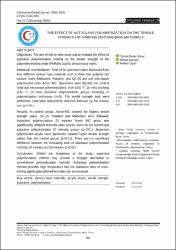| dc.contributor.author | Deste Gökay, Gonca | |
| dc.contributor.author | Durkan, Rukiye | |
| dc.contributor.author | Oyar, Perihan | |
| dc.date.accessioned | 2021-05-05T22:11:52Z | |
| dc.date.available | 2021-05-05T22:11:52Z | |
| dc.date.issued | 2020 | |
| dc.identifier.issn | 2146-2852 | |
| dc.identifier.uri | https://doi.org/10.7126/cumudj.798591 | |
| dc.identifier.uri | https://hdl.handle.net/20.500.12933/195 | |
| dc.description | 2-s2.0-85102805612 | en_US |
| dc.description.abstract | Objectives: The aim of this in vitro study was to evaluate the effect of autoclave polymerization method on the tensile strength of the polymethylmethacrylate (PMMA) acrylic denture base resins.Materials and Methods: Total of 60 specimens were fabricated from four different denture base materials such as three heat polymerized denture resins Meliodent, Paladent, and QC-20 and one microwave polymerized resin Acron MC. Specimens were divided into control (heat and microwave polymerization), short (130 °C 10 min) and long (130 °C 20 min) autoclave polymerization groups according to polymerization techniques (n=5). The tensile strength tests were performed. Data were analyzed by ANOVA followed by the Duncan test (?=0.01).Results: In control group, Acron-MC showed the highest tensile strength value, QC-20, Paladent and Meliodent were followed. Autoclave polymerization 20 minutes Acron MC group was significantly different from the other acrylic resins for the control and autoclave polymerization 10 minutes groups (p<0.01). Autoclave polymerized acrylic resin specimens showed higher tensile strength values than the control groups (p<0.01). There was no significant difference between the increasing time of autoclave polymerization methods 10 minutes and 20 minutes (p>0.01).Conclusion: Within the limitations of the study, autoclave polymerization method may provide a stronger alternative to conventional polymerization methods. Autoclave polymerization method provides high temperature that the activation ratio of cross-linking agents (glycoldimethacrylate) can be increased. © 2020. All Rights Reserved. | en_US |
| dc.language.iso | eng | en_US |
| dc.publisher | Cumhuriyet University Faculty of Dentistry | en_US |
| dc.rights | info:eu-repo/semantics/openAccess | en_US |
| dc.subject | acrylic resins | en_US |
| dc.subject | autoclave | en_US |
| dc.subject | denture base materials | en_US |
| dc.subject | polymerization | en_US |
| dc.subject | tensile strength | en_US |
| dc.title | The Effect of Autoclave Polymerization on the Tensile Strength of Various Denture Base Materials | en_US |
| dc.type | article | en_US |
| dc.department | AFSÜ, Diş Hekimliği Fakültesi, Klinik Bilimler Bölümü | |
| dc.contributor.institutionauthor | Durkan, Rukiye | |
| dc.identifier.doi | 10.7126/cumudj.798591 | |
| dc.identifier.volume | 23 | en_US |
| dc.identifier.issue | 4 | en_US |
| dc.identifier.startpage | 364 | en_US |
| dc.identifier.endpage | 370 | en_US |
| dc.relation.journal | Cumhuriyet Dental Journal | en_US |
| dc.relation.publicationcategory | Makale - Uluslararası Hakemli Dergi - Kurum Öğretim Elemanı | en_US |
















